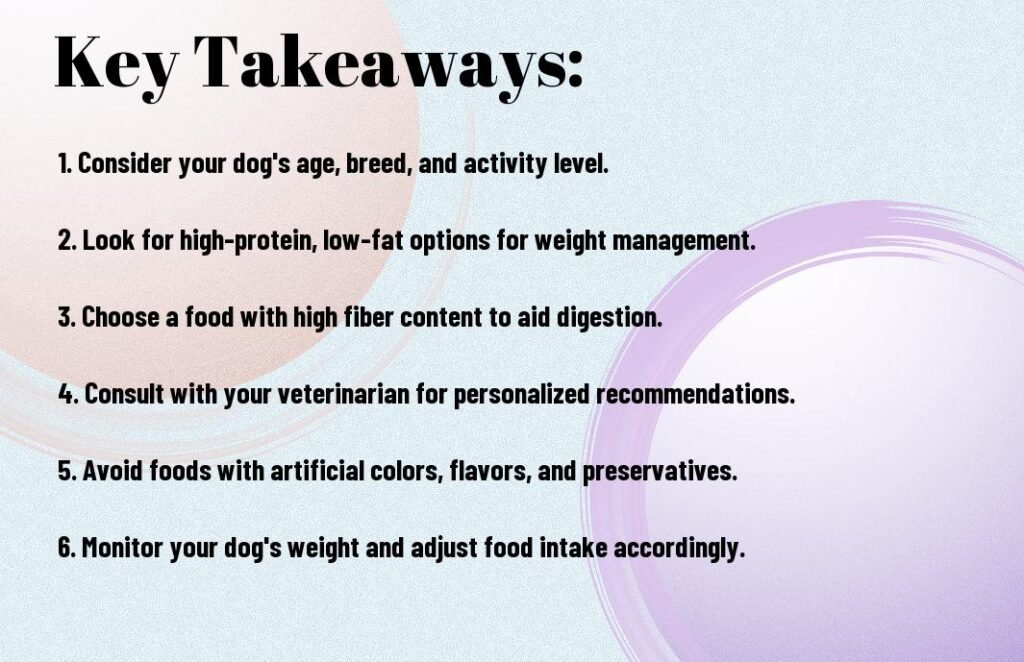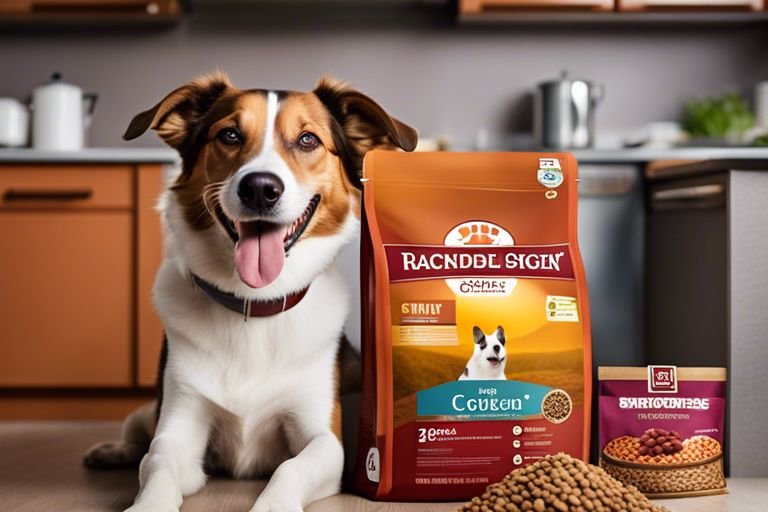How To Choose The Best Dog Food For Weight Management

Many pet owners often struggle to find the right balance when it comes to choosing the best dog food for weight management. It’s crucial to consider your furry friend’s unique needs and health requirements. In this guide, you will learn how to select the perfect dog food that will help your companion maintain a healthy weight while still enjoying delicious and nutritious meals. By following these tips and recommendations, you can ensure that your dog stays happy, healthy, and at their ideal weight.
Key Takeaways:
- Evaluate Your Dog’s Needs: Consider your dog’s age, weight, activity level, and health condition to choose the right dog food for weight management.
- Look for High-Quality Ingredients: Opt for dog foods with real meat, whole grains, fruits, and vegetables to provide crucial nutrients without excessive calories.
- Check the Calorie Content: Select a dog food with an appropriate calorie content according to your dog’s weight loss or weight maintenance goals.
- Consider Special Formulas: Choose weight management formulas that are specially tailored for dogs with weight issues or those that are less active.
- Consult Your Vet: Always consult with your veterinarian before making significant changes to your dog’s diet to ensure it suits your dog’s specific needs and health condition.

Identifying Your Dog's Weight Management Needs
Determining Your Dog's Ideal Weight
The first step in identifying your dog food for weight management needs is determining their ideal weight. This can vary depending on the breed, size, and build of your dog. Consult with your veterinarian to establish a healthy weight range for your furry friend.
Assessing Your Dog's Activity Level
Any assessment of your dog’s weight management needs should include an evaluation of their activity level. Take into account how much exercise your dog gets daily and adjust their food intake accordingly. A more active dog may require a higher calorie intake to maintain a healthy weight.
Assessing your dog’s activity level involves observing their daily exercise routines, playtime, and overall energy levels. If your dog is more sedentary, you may need to adjust their diet to prevent weight gain. On the other hand, if they are very active, they may need a higher calorie diet to support their energy needs.
Considering Your Dog's Age and Health Status
When choosing the best dog food for weight management, it’s imperative to consider your dog’s age and health status. Older dogs may have different nutritional needs than younger ones, and certain health conditions may require specific dietary restrictions. Consult with your vet to determine the best diet for your dog’s age and health.
It’s crucial to tailor your dog’s diet to their specific age and health requirements. For example, senior dogs may benefit from joint-supporting ingredients, while dogs with medical conditions such as diabetes may require a specialized diet. By considering these factors, you can ensure that your furry companion maintains a healthy weight and overall well-being.
Nutritional Requirements for Weight Management
Protein Content: Quality vs. Quantity
One key factor to consider when selecting a dog food for weight management is the protein content. An adequate supply of high-quality protein is necessary for maintaining lean muscle mass and promoting healthy weight loss in your pet.
Fat Content: The Good, the Bad, and the Ugly
The fat content in your dog’s diet plays a crucial role in weight management. The type of fats included in the food is vital – healthy fats such as omega-3 fatty acids can support your dog’s overall health, while excessive unhealthy fats can contribute to weight gain.
When managing your dog’s weight, it is necessary to pay attention to the fat content of their food. While some fats, like omega-3 fatty acids, are beneficial for your pet’s health, excessive amounts of unhealthy fats can lead to weight gain and other health issues.
Carbohydrate Content: Friend or Foe?
Carbohydrates can be a contentious topic when it comes to weight management in dogs. While carbohydrates can be a good source of energy, excessive amounts or the wrong type of carbohydrates can contribute to weight gain. It is necessary to strike a balance and choose dog food with the right amount and quality of carbohydrates to support your pet’s overall well-being.
Fiber Content: The Unsung Hero
Fiber is often overlooked but plays a crucial role in weight management for dogs. High-fiber dog food can help your pet feel full and satisfied while reducing overall calorie intake. Additionally, fiber promotes healthy digestion and can aid in weight loss by regulating blood sugar levels and supporting a healthy metabolism.

Types of Dog Food for Weight Management
Unlike regular dog food, weight management dog food comes in various types tailored to help your furry friend maintain a healthy weight. Understanding the different options available can help you make an informed decision on what’s best for your pup. Here are some common types of dog food for weight management:
| High-Protein Diets | Low-Carb Diets |
| Fiber-Rich Diets | Prescription Diets |
| Limited Ingredient Diets | Senior Weight Management |
This information can help you choose the right food for your dog’s specific needs.
High-Protein Diets: Pros and Cons
One of the main advantages of high-protein diets for weight management is that they can help your dog feel fuller for longer periods, reducing the chances of overeating. Additionally, protein helps maintain muscle mass, which is crucial for weight loss. However, high-protein diets may not be suitable for all dogs, especially those with kidney issues or other health conditions. It’s imperative to consult your vet before switching to a high-protein diet for weight management.
Low-Carb Diets: Do They Really Work?
Any weight management plan for your dog should consider the effectiveness of low-carb diets. While reducing carbohydrates can aid in weight loss, it’s imperative to ensure your dog still gets all the necessary nutrients. Some dogs may not respond well to low-carb diets, so monitoring their progress and consulting with your vet is crucial to determine if this type of diet is suitable for your furry companion.
Management Balanced Diets: The Middle Ground
LowCarb balanced diets provide a middle ground for weight management, offering a mix of proteins, carbohydrates, and fats to support your dog’s overall health. These diets aim to provide imperative nutrients while managing your dog’s weight effectively. By finding the right balance of nutrients and calories, you can help your dog maintain a healthy weight without compromising on imperative dietary needs.
Prescription Diets: When to Consider Them
Middle Prescription diets are formulated to address specific health issues that may contribute to weight gain or make weight management challenging for your dog. If your dog has underlying health conditions such as thyroid problems or joint issues, your vet may recommend a prescription diet tailored to address these issues while managing your dog’s weight effectively. Consulting with your vet can help determine if a prescription diet is necessary for your dog’s overall well-being.

Ingredients to Look For (and Avoid)
For a comprehensive guide on choosing the best weight management dog food, check out this Guide to Choosing the Best Weight Management Dog Food.
Whole Foods vs. By-Products
For optimal weight management, prioritize dog foods with whole food ingredients over by-products. Whole foods provide important nutrients and are generally more nutritious for your pup.
Added Supplements: Helpful or Harmful?
On the topic of added supplements, it’s important to strike a balance. While some supplements can support your dog’s weight management journey, excessive or unnecessary additives may do more harm than good.
Aim to choose dog foods with added supplements like omega-3 fatty acids for joint health and metabolism support, but be cautious of products with an overwhelming amount of added vitamins and minerals, as they may not be well-regulated or necessary for your dog’s well-being.
Artificial Preservatives and Additives: Red Flags
Artificial preservatives and additives are red flags when it comes to selecting weight management dog food. These ingredients can have negative effects on your dog’s health and may contribute to weight gain or other issues.
Be sure to read the labels carefully and avoid dog foods with artificial preservatives such as BHA, BHT, and ethoxyquin. Opt for natural preservatives like tocopherols (vitamin E) instead.
Reading Labels and Making Sense of Claims
Deciphering Nutritional Labels
For a quick overview of a dog food’s nutritional value, look at the guaranteed analysis, ingredient list, and feeding guidelines. The guaranteed analysis provides percentages of protein, fat, fiber, and moisture, helping you compare different products. Check the ingredient list to ensure high-quality sources of protein are listed first, and avoid foods with fillers like corn or by-products. Lastly, feeding guidelines can help you determine the appropriate amount to feed your dog based on their weight and activity level.
Beware of Marketing Hype: Separating Fact from Fiction
Marketing claims on dog food packaging can be misleading. Words like “premium,” “natural,” or “holistic” are not regulated and may not signify higher quality. Look past flashy marketing to the guaranteed analysis and ingredient list for true nutritional value. Be cautious of marketing tactics that appeal to emotions rather than facts about a product’s actual nutrition.
Avoid falling for flashy packaging and misleading marketing tactics when selecting dog food. Remember that terms like “premium” and “natural” are not regulated and may not indicate superior quality. Your focus should be on the nutritional content and ingredient list, ensuring you make an informed decision based on facts rather than marketing hype.
What to Look for in a Manufacturer's Reputation
Hype around a dog food brand can be enticing, but it’s crucial to dig deeper into the manufacturer’s reputation. Research the company’s history, sourcing practices, and any recalls or controversies. Look for brands with a solid track record of producing high-quality, safe products and transparency in their manufacturing processes. A trustworthy manufacturer is more likely to prioritize your dog’s health and well-being.
When evaluating a dog food brand, consider the manufacturer’s reputation. Look for brands with a history of quality products, transparent sourcing, and a commitment to safety. Prioritize companies that have a positive track record and prioritize the health of your pet above all else.

Feeding Strategies of Dog Food For Weight Management
Meal Frequency and Portion Control
Not all dogs require the same meal frequency and portion sizes. For Dog food for weight management, it’s crucial to feed your pet the right amount of food at the right times.
Free Feeding vs. Scheduled Feeding
Free feeding, where food is left out for your dog to eat at will, can lead to overeating. Scheduled feeding, with set meal times, allows for better control over your dog’s food intake.
Strategies: When deciding between free feeding and scheduled feeding, consider your dog’s eating habits and activity level. Scheduled feeding can help with portion control and prevent weight gain, while free feeding may work for dogs who self-regulate their food intake effectively.
Treats and Snacks: How to Make Them Count
The type and amount of treats you give your dog can impact their weight management goals. Choose healthy, low-calorie treats and factor them into your dog’s daily caloric intake to avoid weight gain.
Weight: To make treats and snacks count towards your dog’s weight management, opt for options such as carrots, green beans, or commercial low-calorie treats. Avoid high-fat, high-calorie treats that can derail your efforts to help your dog maintain a healthy weight.
Final Words
Summing up, choosing the best dog food for weight management is crucial for your furry friend’s health and well-being. By carefully reading and understanding the food labels, considering your dog’s specific needs, and consulting your veterinarian, you can make an informed decision. Bear in mind, maintaining a healthy weight is necessary for your dog’s overall happiness and longevity. Your commitment to providing the best nutrition will surely pay off in your dog’s vitality and quality of life.
FAQ
Q: Why is weight management important for dogs?
A: Maintaining a healthy weight is necessary for a dog’s overall well-being. Excess weight can lead to various health issues such as diabetes, joint problems, and heart disease.
Q: What should I look for in a dog food for weight management?
A: Look for a dog food that is specifically formulated for weight management, with high-quality protein sources, adequate fiber content, and limited fat content. Also, avoid dog foods with fillers and artificial additives.
Q: How can I determine the right amount of food to feed my dog for weight management?
A: The amount of food your dog needs will depend on factors such as their size, age, activity level, and metabolism. Consult with your veterinarian to determine the appropriate portion size for your dog.
Q: Are there any ingredients I should avoid in dog food for weight management?
A: Avoid dog foods with high levels of carbohydrates, fillers such as corn and wheat, and artificial preservatives and colors. These ingredients can contribute to weight gain and overall poor health.
Q: How long does it take to see results from feeding my dog weight management dog food?
A: Results can vary depending on the dog, but typically you should start to see noticeable changes in your dog’s weight and overall health within 6-8 weeks of switching to a weight management dog food and following recommended feeding guidelines.




